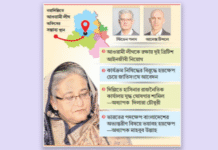Bangladesh will screen passengers coming from West Africa’s Ebola virus affected countries as “an additional measure” to prevent the deadly virus from travelling to Dhaka.
The health ministry has formed a committee that includes all relevant stakeholders including the immigration and civil aviation authorities to enforce the decision.
Health Secretary MN Neazuddin is chairing the committee, IEDCR, director Prof Mahmudur Rahman who is also a member of the committee told bdnews24.com.
The decision has been taken at a meeting chaired by the health minister Mohammed Nasim at the Secretariat on Sunday.
Junior health minister Zahed Malik and junior home minister Asaduzzaman Khan were present.
Prof Rahman said the affected countries would screen all outbound passengers, but “we took this decision (screening) as “an additional measure”.
He said a ward at the Kurmitola General Hospital which is nearby Hazrat Shah Jalal International Airport will be kept ready if needed for the “isolation” of a Ebola suspect.
The move comes as the World Health Organization (WHO) declared the spread of the virus in West African countries like Liberia, Sierra Leon, Guinea and Nigeria as an international health emergency.
The UN agency said 961 people died in West Africa this year out of total 1,779 cases of Ebola.
Bangladesh, however, considers it “a low risk” country given the disease remained confined as far afield as West Africa and WHO advised “exit screening” of those affected countries.
There is no direct air links from those countries that experts said also made the virus difficult to travel to Bangladesh as its mortality rate is as high as 90 percent.
The IEDCR director said all the ports would be instructed to screen the inbound passengers from West African countries and they would supply some Personal Protective Equipment (PPE) for the authorities.
He said this instruction would remain valid for the next three months after which they would review the situation following WHO’s global review.
WHO earlier advised affected states to conduct “exit screening” of all persons at international airports, seaports and major land crossings, for unexplained febrile illness consistent with potential Ebola infection.
“There should be no international travel of Ebola contacts or cases, unless the travel is part of an appropriate medical evacuation,” it advised.
It has also asked countries where the virus has not spread so far not to impose any “general ban on international travel or trade”.
WHO blamed the aggravated situation in West Africa to weak health systems, lacking in human, financial and material resources while categorising Ebola as an international emergency.
The disease has no proven cures and there is no vaccine to prevent infection.
Treatment focuses on alleviating symptoms such as fever, vomiting and diarrhoea – all of which can contribute to severe dehydration.
Prof Rahman said they were training doctors to treat the virus and its management.
Person‐to‐person transmission of the virus results from direct contact with the body fluids or secretions of an infected patient.
Ebola, mainly an animal disease, was first reported in Congo in 1976.
The disease got the name after a river in Congo.
Bangladeshi peacekeepers posted in that region remained free from the virus so far, the ISPR earlier said.
Source: bdnews24










